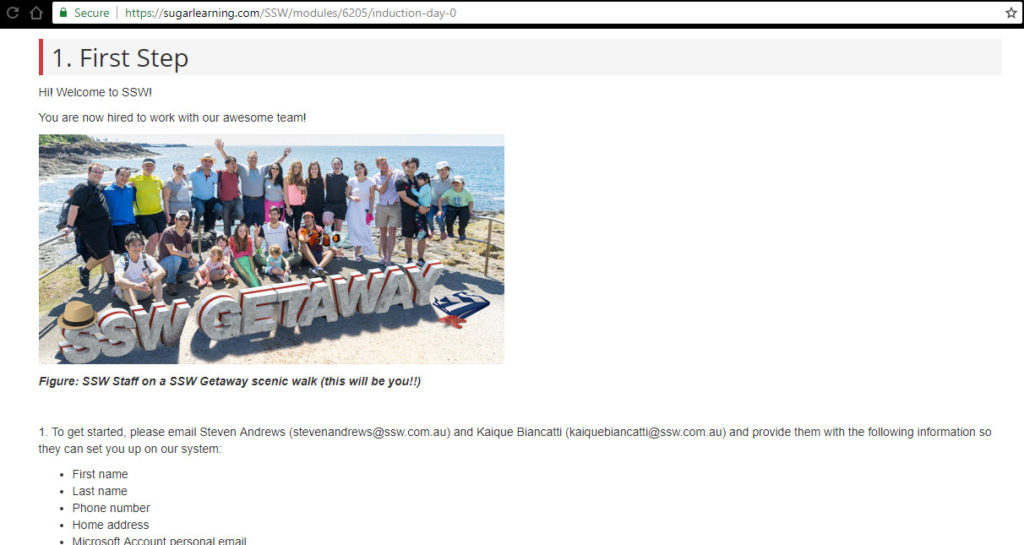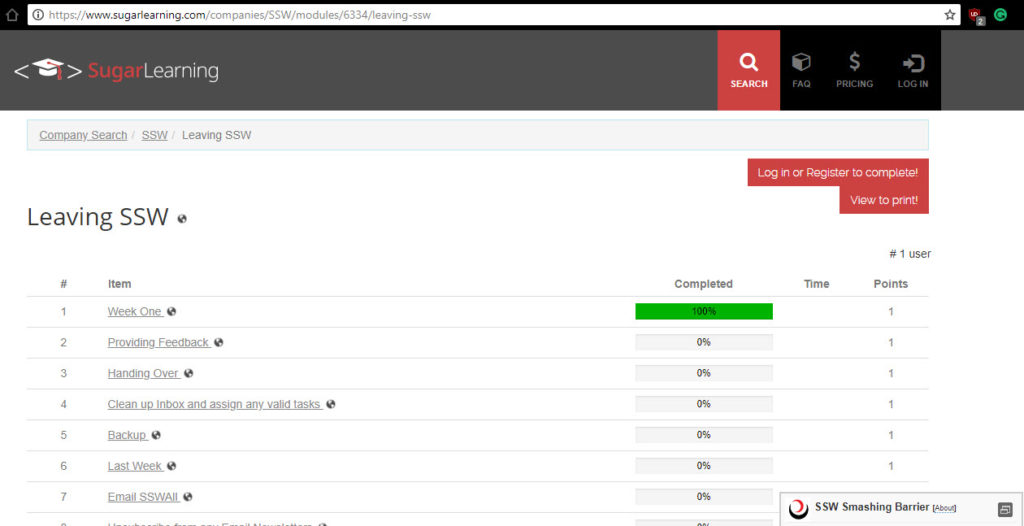New employees – saying hello, saying goodbye
Changes in working life rate among some of the most stressful events a person can experience. I’ve been running my own business for around 25 years, and in that time I’ve come up with a list of “hello” and “goodbye” tips to help employees with the start and end of their journey with an employer. I believe that these tasks are simple for employees to follow and can minimise stress.
In my experience, every employee has done some of these but never had someone do them all 🙂 Happy to hear if I’ve missed any.
No boss is perfect, no employee is perfect. In my experience, it’s a good idea to have a mentor/manager to be assigned and to have a good system. (On the topic of a good system, SSW built and use www.SugarLearning.com)

Saying hello:
Make it an upbeat entrance, rather than sliding in under the radar. These are the things you can do:
Tip #1: You’re going to be meeting a lot of people in rapid succession, and it can be a struggle to remember so many new names. I’d recommend you have a technique to help remember everyone.
For example, as you meet new people, shake their hands while saying their name. Then try to draw yourself a map of the area and then write out everyone’s names based on where they’re sitting (similar to what I recommend presenters do with a new audience). In the first few days, try to use their names in sentences a lot.
Note: If you work in a hot-desking environment, which has its fair share of pain, you will need to be careful and do this again every day.
Tip #2: Send an email introducing yourself to your new team. Tell people what you like doing in your professional life, what you’re good at, and any goals you have. Also include pictures of you in your leisure time, to give your new co-workers an understanding of you as a whole person.
Tip #3: Have a discussion with your manager/mentor – ask them what they value in an employee, and their preferences. Ask them what they think their boss values too and try to get a feel for who they are. Ask what they think might be easy or challenging about the job and how would they go about doing the hard jobs (try to get the boss to give you answers to the “exam”). Run through scenarios about what you might do in different situations and explore solutions.
Tip #4: Ask the boss what they consider “good dress” and “bad dress” – this will vary greatly on your industry, whether you’re public facing, and the company’s own unique culture. At SSW, we have the “devolution”.
Tip #5: Watch the video “The 5 Languages of Appreciation in the Workplace“, and try to figure out what key employees and clients (and anyone you’ll deal with regularly) prefer.
- Words of affirmation – some people like to be praised in front of the team;
others might prefer to be praised in private - Quality time with a boss or mentor – this will help build a rapport and strengthen a relationship
- Acts of Service – doing things to make the employees life at work a bit easier by helping them with something they’ve been struggling with. This can be in the workplace, or, depending on the type of relationship, it might even be something like sending a housekeeper or cleaner to their home if you know they’ve been struggling to juggle work with kids and a busy family life
- Tangible gifts – instead of a thank you note, you could offer a tangible gift as a reward for excellent work, such as a new electronic device or a shopping voucher. The gift should be specific to the recipient, though there should be transparency with regard to how these gifts are given – the whole team should be aware that this type of reward is possible, and the rewards given openly
- Physical touch – Some people might prefer a literal pat on the back, but this is something that should be done carefully and mindfully, with an understanding of what the employee wants and is comfortable with. (In light of the #metoo movement, it might be best to ignore this as an option entirely and focus on the other 4 appreciation languages)
Here’s a tweet summarising the languages:
The five love languages:
Words of Affirmation: This is a good burrito.
Acts of Service: I made you a burrito.
Receiving Gifts: Here’s a burrito.
Quality time: Let’s go get some burritos together.
Physical touch: Arms around a person wrapped in a warm hug, like a burrito.
— CREEDO (@Alonzo_Creed) July 10, 2018
The reality with these 5 love languages is that most people like all of them. It’s important to do lots of little things, more important than doing just one big thing.
Tip #6: When you’re first starting, you could write a blog post about your ambitions for yourself and the work you’ll be doing with the company. It can be really helpful to revisit this blog post throughout your tenure at a company to reflect and consider how you’re going and whether you still agree with your initial ambitions.
Here’s a good example: https://damianbrady.com.au/2011/05/07/a-change-for-the-better/
It should be noted that Damian Brady went on to become very successful as “Mr. DevOps WorldWide” for Microsoft.
Tip #7: You’re going to receive emails where you think, “WTF?”. Most companies rely heavily on email to communicate, but email can be dangerous as the intended tone and context can be lost when communication is reduced to words on a screen. Don’t be afraid to jump up and walk to the sender’s desk and ask. If they’re remote, then pick up the phone and get confirmation of what was intended.
Tip #8: Feedback is a 2-way street. Just as your new team will be giving you feedback, you should be critically evaluating their practices too, as the ultimate goal should be to make each other better. When you first get started, you might encounter some practices that you feel are unhelpful – and if this is the case, you should let them know. Situations can’t improve without feedback!
Tip #9: Most of all, try to be resilient – there’s a lot to learn, especially at first, and chances are you won’t get everything right the first time. It will take time to fully get into the swing of things, and that’s okay – just keep doing your best.
It’s quite common for employees early on to not be very open, and it’s super hard in the beginning to be productive. It’s especially difficult if you’re shy by nature because you need to be able to interact well with your co-workers to get up to speed quickly. I’d recommend you seek out a couple of well-connected people in the organisation who you can go to for help or direction until you figure it out for yourself.
Most companies hire a person because they think that person is a cultural fit. If you’ve been hired, you should feel confident – the person that’s hired you thinks you’re going to fit in. Now you just need to learn the company culture nice and quick so you fit in like a foot in a good shoe.
—
For most of your time at a company – the “middle” portion of your employment – it’s your job to stay engaged, to be involved in corporate events, and to do more than just turn up to work. Employers value people who are engaged and invested in contributing to the culture. Chances are, you spend more of your awake time at work than you do anywhere else so it’s up to you make it the best it can be.
—
I’ve also put together a list of best practices for when it’s time to leave a job. It’s sad when people leave, but most employees exit on good terms. For a boss, it’s always nice to see someone move on to do great things – they might even come back. Leaving a company doesn’t have to mean a cutting of ties.

Saying goodbye:
Let’s make the assumption that if you had problems at your company, you’ve done everything you can to rectify them – you’ve highlighted them and gone through the steps you can do. If you still think it’s in your best interest to move on, then… make it a celebration rather than vanishing quietly.
I know big companies don’t do all of these points, but I encourage all of them at SSW. This is my list of things to do when you’re leaving a job – you’ll see that a lot of these points marry up with suggestions I made in the “Say Hello” section:
Tip #1: Have a conversation – don’t resign via email. Having been on the receiving end of bad news many times, I know that I always prefer to hear it directly. If you can’t do it face to face, over the phone is also okay, but always try to have a direct conversation about it.
Of course, you should send an email as well, so you’ve got a communication trail, but it should be an “As per our conversation” email, sent after the conversation has concluded.
Tip #2: Just as when you started, take the time to say goodbye to your co-workers. Shake their hands and say their names as you bid them goodbye.
Tip #3: Send a farewell email to your team. Talk about what you liked, what you learnt, and what you’ll be doing next – both professionally and personally. If you’re comfortable doing so, include your personal contact details so people can stay in touch with you after you’ve left.
Tip #4: Have a discussion with your boss about what they liked about you/your performance and what they didn’t, so you know what to keep doing and what to improve.
Tip #5: Rewatch the 5 Languages of Appreciation in the Workplace video, and reflect on how accurate you were with what you first thought people preferred.
Tip #6: Write a farewell blog post (be sure to include a link to the blog post you wrote when you first started). In this, you should include your reflections and observations on your time there, what you’ve learnt or would do differently, and what you’ve achieved.
Note: If you’re not leaving on good terms, this is not advisable, because even a soft-ish sentence like “I found these things challenging…” can burn people.
Tip #7: It’s important to hand over your projects in an organised fashion (here’s our handover rule), but you should prepare more than just handover notes. Prepare tips for your replacement, so they know the inefficient parts of the organisation, the stuff you learned through the school of hard knock – because let’s face it, people don’t really change that much.
Tip #8: If you’ve had a good boss, write them a note and thank them – it’s even better if you hand write it.
Treat every exit as a future relationship to be nurtured. Put in the effort to stay in touch with your old team. The industry is small. The relationships you build through your career are among the most important professional assets you can have, and are always worth preserving.
